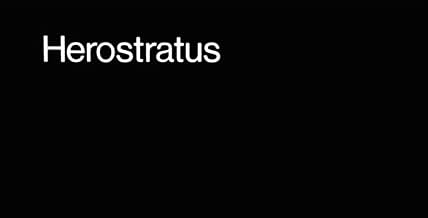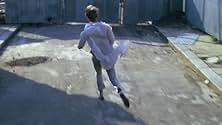Adicionar um enredo no seu idiomaWhen young poet Max (Michael Gothard) hires a marketing company to turn his suicide-by-jumping into a mass-media spectacle, he finds that his subversive intentions are quickly diluted into a... Ler tudoWhen young poet Max (Michael Gothard) hires a marketing company to turn his suicide-by-jumping into a mass-media spectacle, he finds that his subversive intentions are quickly diluted into a reactionary gesture, and his motivations are revealed as a desperate attempt to seek atte... Ler tudoWhen young poet Max (Michael Gothard) hires a marketing company to turn his suicide-by-jumping into a mass-media spectacle, he finds that his subversive intentions are quickly diluted into a reactionary gesture, and his motivations are revealed as a desperate attempt to seek attention through celebrity.
- Sandy
- (as Mona Chin)
- Radio Presenter
- (narração)
- Poet
- (narração)
- Patient on Bed
- (não creditado)
Avaliações em destaque
Max (Michael Gothard), is a struggling poet. He is agonised by society around him, and like Travis Bickle in the later film Taxi Driver (1976), he foments a distinctive hatred whilst holding up alone in a disheveled flat in a distorted, crumbling London. But unlike Bickle, Max's ideas are motivated by fame. He proposes to a marketing executive, Farson (Peter Stephens), an offer he cannot refuse. Max will publicly kill himself by jumping off of a tall building, and the advertising company can own this commodity, and do whatever they please with it. The machinations of the marketeers begins, as they attempt to come up with adequate exposure for the death-as-entertainment, subversive performance art piece. The silence that preceded Max's encounter with Farson, is perfectly highlighted in a line from Albert Camus, in his book 'The Myth of Sisyphus': An act like this (suicide) is prepared within the silence of the heart, as is a great work of art. As the workings of the sadistic minds of advertisers is quietly taking place in the background, Max begins a relationship of sorts with Farson's secretary, Clio (Gabriella Licudi), with devastating consequences.
As a commodity, Max is used, humiliated, and displayed as despicable for his desperate attempt at using his death for fame and immortality. The title of the film is taken from a character from ancient Greece who wanted immortality; which he gained by setting fire to the Temple of Artemis. The film is most certainly relevant today with our wealth of deluded people, hungry for fame with no substance. Fame has itself become a commodity: We are in an age of fame that is hinged on one act; one single moment. And like the fame that Max is attempting to gain, it is also very fleeting.
The films technical brilliance is in its editing, a process that took Levy two years to perfect. Levy approached editing like science (he did have a PhD in Experimental Physics). The film is littered with subliminal images. Short sequences of static shots, obscure imagery, and images of animal slaughter. The latter of these are often used to juxtapose with images of a female stripper. The snippets also seem to appear, not just as fractured images of a deranged mind, but also almost synonymous with televisual adverts themselves. Almost self contained. In one, a very young Helen Mirren (uber-MILF) seduces the camera and its audiences, stating that you want her. The use of jump-cuts and long takes is reminiscent of the then new European movements, mostly evoking some of the work of Godard and Antonioni.
It's an interesting piece of forgotten cinema. As with many art-house films of this type, it is highly pretentious. But it is watchable pretension. It's idea does not really carry throughout the film, and it could have gone in more interesting angles. But this could perhaps be just an opinion from today's perspective: Marketing has certainly become more all-pervasive since the late 1960's. As a closing statement, it is ironic that later, both Don Levy and Michael Gothard ended their lives by suicide. The film remains though, and is at times visually arresting. Classic? No. But as an artifact of British '60's cinema, it is a delight.
www.the-wrath-of-blog.blogspot.com
This British underground film was unseen for close to forty years before it was resurrected by the BFI. It is a very odd film indeed, pretty much fully an avant-garde piece. The story-line is essentially quite basic and not a huge amount of plot really happens, which for a 142min film is unusual. For me, by far the most interesting thing about this one was its visual ideas. It's a film which is relentlessly experimental in approach with elements of surrealism. The memorable visuals are often achieved by way of very bold editing techniques used throughout, where contrasting images are juxtaposed with each other. There is recurring imagery used extensively, including a mysterious black clad woman wandering the backstreets of London, an exotic dancer interspersed with images from a slaughterhouse, old newsreels and many billboard advertisements. There is a hell of a lot more than this as well but this is a film which throws a lot at you and it can be hard recalling precisely everything that occurs. There is a mixture between very long single takes and fast edits, the former are used for dramatic intensity. Michael Gothard is the lead here and he is an actor associated with intense performances, so he is a good fit it has to be said. The film overall is certainly a fascinating watch but it is slow in places and there are patches where it does get a bit tedious. The narrative was semi-interesting but the visual invention is really what it's worth seeing for and it is for sure a film that should be seen by those drawn towards experimental cinema. Look out too for an appearance of a very young Helen Mirren.
I have never been more moved by a film. I can compare it only to such transforming experiences as seeing L'Avventura in the early 'sixties, although the art of Herostratus is far more mysterious. The mystery is compounded by the great gulf of years that separates me from that screening, by the fact that almost nobody I meet has seen it or even heard of it, and by the apparent lack of any body of explication and commentary.
Without seeing it again I wouldn't attempt a precis of the plot, but what remains in memory is the cool classicism of the narrative(innocence vs. worldliness and levels of manipulativeness that Henry James might have appreciated) as mediated through an unobtrusive but arresting surrealism of technique.
It's been 35 years--I'd really like to revisit Herostratus.
Combining satire and tragedy, and starring the brilliant Michael Gothard, this is a blazing account of how acts of genuine rebellion are ultimately destined to be commodified and sanitised and deserves to be appreciated by a wider audience looking for drama presented in an offbeat manner.
Você sabia?
- CuriosidadesHelen Mirren's debut.
- ConexõesEdited from Nazi Concentration Camps (1945)
Principais escolhas
- How long is Herostratus?Fornecido pela Alexa
Detalhes
- Tempo de duração
- 2 h 22 min(142 min)
- Cor
- Mixagem de som

























